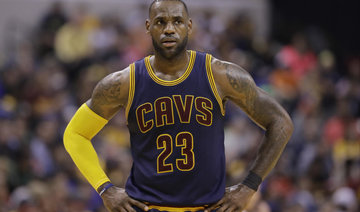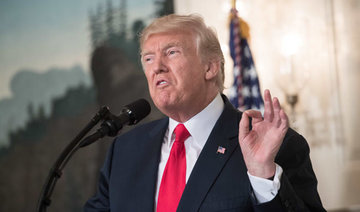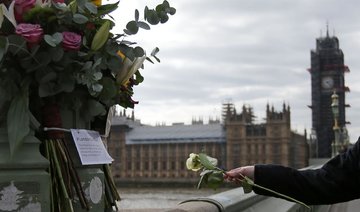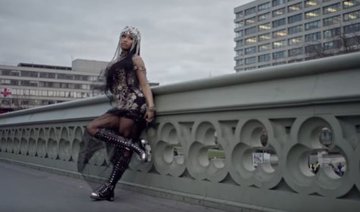NEW YORK: US President Donald Trump sparked another political firestorm Tuesday when he doubled down on his initial response to the violent white supremacist rally in Charlottesville that ended in bloodshed, saying there was “blame on both sides.”
The Republican president — who one day ago solemnly denounced racism and singled out the Ku Klux Klan and neo-Nazis as “criminals and thugs” — also hit out at what he called the “alt-left” over the weekend melee.
Trump has faced days of criticism from across the political spectrum over his reaction to Saturday’s unrest in the Virginia college town, where a rally by neo-Nazis and white supremacists over the removal of a Confederate statue erupted in clashes with counter-demonstrators.
The violent fracas ended in bloodshed when a 20-year-old suspected Nazi sympathizer, James Fields, plowed his car into a crowd of anti-racism protesters, leaving one woman dead and 19 others injured.
In a rowdy exchange with journalists at Trump Tower in New York, Trump made clear on Tuesday that he was fed up with continued questioning about the issue.
“I think there is blame on both sides,” Trump said.
As he spoke, his new White House Chief of Staff John Kelly, a former Marine general, appeared displeased during the president’s long tirade, standing rigidly.
“You had a group on one side that was bad, and you had a group on the other side that was also very violent. And nobody wants to say that, but I’ll say it right now,” Trump continued.
“What about the alt-left that came charging... at the, as you say, the alt-right? Do they have any semblance of guilt? (...) There are two sides to a story.”
“What about the fact they came charging with clubs in their hands, swinging clubs? Do they have any problem? I think they do. As far as I am concerned, that was a horrible, horrible day,” Trump said.
Trump’s comments were immediately welcomed by David Duke, a former “grand wizard” of the Ku Klux Klan and a key figure at Saturday’s rally.
“Thank you President Trump for your honesty & courage to tell the truth about #Charlottesville & condemn the leftist terrorists,” Duke tweeted.
But on the political left, the president’s words were met with indignation.
“Charlottesville violence was fueled by one side: white supremacists spreading racism, intolerance & intimidation. Those are the facts,” said Tim Kaine, a former Democratic vice presidential candidate and senator from Virginia.
The state’s other Democratic senator, Mark Warner, tweeted: “No words.”
Trump’s fellow Republicans also didn’t mince words.
“We must be clear. White supremacy is repulsive,” Republican House Speaker Paul Ryan wrote on Twitter.
“This bigotry is counter to all this country stands for. There can be no moral ambiguity.”
And the condemnations also spilled beyond the political realm.
NBA superstar LeBron James tweeted: “Hate has always existed in America. Yes we know that but Donald Trump just made it fashionable again!“
After the contentious press conference, the head of the main US labor union, the AFL-CIO, joined several high-powered executives in stepping down from Trump’s manufacturing advisory panel.
Outside Trump Tower where the president spoke, hundreds of people protested to denounce racism. They were surrounded by police officers to prevent clashes with a handful of Trump supporters nearby.
Protesters chanted: “We are here to stay, we are here to fight!“
“I would not have come here if I had not seen him say that on TV 20 minutes ago,” said actor Jason David, 23.
When asked why he waited until Monday to explicitly condemn hate groups present in Charlottesville, Trump said he wanted to be careful not to make a “quick statement” on Saturday without all the facts.
“I wanted to make sure, unlike most politicians, that what I said was correct,” Trump insisted.
Trump called Fields, who has been charged with second-degree murder, a “disgrace to himself, his family and this country.”
But he also said that while there were troublemakers at the rally, there were also many people there “to innocently protest and very legally protest” the removal of a “very important statue” of Confederate general Robert E Lee.
“I wonder, is it George Washington next week? And is it Thomas Jefferson the week after?” he said angrily, referring to the fact they owned slaves.
“Are we going to take down statues to George Washington? How about Thomas Jefferson? ... You’re changing history. You’re changing culture.”
The president also defended his controversial far-right chief strategist Steve Bannon, insisting that “he is not a racist,” but without ruling out his possible departure from the West Wing.
Pressed as to whether he might visit Charlottesville, Trump — criticized by some for not telephoning victims of the violence — said he owns “one of the largest wineries in the United States” in that area.
The president bought the winery in 2011 and has given it to his son, Eric Trump.
Lawmaker Gwen Moore, a Wisconsin Democrat, urged Republicans to help remove Trump from office.
“My Republican friends, I implore you to work with us within our capacity as elected officials to remove this man as our commander-in-chief and help us move forward from this dark period in our nation’s history,” she said in a statement.
Trump defiant on Charlottesville unrest: ‘Blame on both sides’
Trump defiant on Charlottesville unrest: ‘Blame on both sides’

Romanian leftist PM and hard-right candidate in a tie after initial presidential election round, partial results show

- Romania’s staunchly pro-Ukraine stance at risk
- Hard-right Georgescu has questioned NATO commitment to collective defense
BUCHAREST: A Romanian hard-right NATO critic and leftist Prime Minister Marcel Ciolacu appeared in dead heat after the first round of presidential elections on Sunday, partial tallies showed, in a shock result threatening Romania’s staunchly pro-Ukraine stance.
After nearly 90 percent of votes were counted, Calin Georgescu, 62, was at 22 percent, while Ciolacu had 21.7 percent. However, ballots from the sizeable Romanian diaspora, which are not included in the main tally, showed a center-right politician, Elena Lasconi, 52, first with 33.4 percent and Georgescu second.
Romania’s president has a semi-executive role that gives him or her control over defense spending — likely to be a difficult issue as Bucharest comes under pressure to uphold NATO spending goals during Donald Trump’s second term as US president while trying to reduce a heavy fiscal deficit.
Lasconi told supporters after exit polls were released giving her a small lead over Georgescu, with Ciolacu in first place, that she was optimistic about making the runoff. “But as you can see, the results are very tight, let us wait until tomorrow’s results to rejoice.”
Campaigning focused largely on the soaring cost of living, with Romania having the EU’s biggest share of people at risk of poverty.
Georgescu is a former prominent member of the hard-right Alliance for Uniting Romanians party.
In 2021 he has called NATO’s ballistic missile defense shield in the Romanian town of Deveselu a “shame of diplomacy” and said the North Atlantic alliance will not protect any of its members should they be attacked by Russia.
Lasconi, a former journalist, joined the Save Romania Union (USR) in 2018 and became party head this year. She believes in raising defense spending and helping Ukraine, and surveys suggest she would beat Ciolacu in a runoff.
Romania shares a 650-km (400-mile) border with Ukraine and since Russia attacked Kyiv in 2022, it has enabled the export of millions of tons of grain through its Black Sea port of Constanta and provided military aid, including the donation of a Patriot air defense battery.
“It will be a tight run-off, with the Social Democrat leader more vulnerable to negative campaigning due to him being an incumbent PM,” said political commentator Radu Magdin.
Somalia says 24 people have died after 2 boats capsized in the Indian Ocean

- A delegation led by the Somali ambassador to Ethiopia is scheduled to travel to Madagascar on Monday to investigate the incident and coordinate efforts to help survivors
MOGADISHU, Somalia: Twenty-four people died after two boats capsized off the Madagascar coast in the Indian Ocean, Somalia’s government said Sunday.
Somalia’s Foreign Minister Ahmed Moalim Fiqi said 46 people were rescued.
“We are working tirelessly to ensure the survivors are brought back home safely and provided with the necessary care,” he said.
Most of the passengers were young Somalis, and their intended destination remains unclear. Many young Somalis embark every year on dangerous journeys in search of better opportunities abroad.
A delegation led by the Somali ambassador to Ethiopia is scheduled to travel to Madagascar on Monday to investigate the incident and coordinate efforts to help survivors.
Fiqi also said Sunday that Somalia’s ambassador to Morocco will look into a separate report of Somali youth stranded on Morocco’s coastline. It is not clear when the Morocco incident took place and Fiqi did not provide details.
The UN migration agency has in the past raised concern over rising cases of irregular migration from the Horn of Africa countries as people flee from conflict and drought.
In April, 38 migrants died and 22 others were rescued from a shipwreck off Djibouti on a popular route to Yemen. Most of those rescued were of Somali and Ethiopian nationalities.
‘It wasn’t just about me’: Imam honored for unity efforts after UK race riots

- Three children were killed, and 10 others — eight of whom were children — were injured in an attack in Southport
- In days following attack, crowds gathered to demonstrate outside Liverpool mosque
LONDON: A Muslim leader in the UK has been recognized for his efforts to foster unity after embracing protesters outside Liverpool’s Abdullah Quilliam Mosque in the wake of a knife attack in the northern English town of Southport in July.
Three children were killed, and 10 others — eight of whom were children — were injured in the attack.
Axel Rudakubana was detained and charged with three counts of murder, 10 counts of attempted murder, and possession of a bladed article.
In the days following the attack, crowds gathered to demonstrate outside the mosque in Liverpool after misinformation was spread online about the knife attack suspect.
Imam Adam Kelwick described how he approached protesters outside the mosque once tensions had eased, offering food, handshakes, and conversations.
Photographs of the peaceful exchanges, which included sharing food and even hugs, went viral, symbolizing a moment of reconciliation.
After receiving the Most Impactful Imam accolade at the British Beacon Mosque Awards, Kelwick said: “It wasn’t just about me. I’m dedicating this award to the people of Liverpool, who really came together during difficult times.”
He added: “Some of the most vocal protesters, after everyone else had gone, came inside the mosque for a little tour.”
The imam praised Liverpool’s residents for their unity.
“For those who knew better than to blame a whole religion for the evil actions of one person, for those who came to defend our mosque, and even for those who protested but later reflected and opened their hearts,” he said.
Kelwick, also a humanitarian aid worker and long-time volunteer, expressed gratitude for the award, which recognizes the contributions of mosques and leaders across the UK.
India mosque survey sparks clashes, two dead

- Hindu nationalist activists were emboldened earlier this year when Modi inaugurated a grand new Hindu temple in Ayodhya, built on grounds once home to Babri mosque
LUCKNOW: Indian Muslim protesters clashed with police Sunday with at least two people killed in riots sparked by a survey investigating if a 17th-century mosque was built on a Hindu temple.
“Two persons were confirmed dead,” Pawan Kumar, a police officer in Sambhal in the northern state of Uttar Pradesh, told AFP, adding that 16 police officers were “seriously injured” during the clashes.
The Press Trust of India news agency quoted officials saying three people had died.
Hindu activist groups have laid claim to several mosques they say were built over Hindu temples during the Muslim Mughal empire centuries ago.
Street battles broke out when a team of surveyors entered the Shahi Jama Masjid in Sambhal on orders from a local court, after a petition from a Hindu priest claiming it was built on the site of a Hindu temple.
Protesters on Sunday hurled rocks at police, who fired tear gas canisters to clear the crowd.
Hindu nationalist activists were emboldened earlier this year when Prime Minister Narendra Modi inaugurated a grand new Hindu temple in the northern city of Ayodhya, built on grounds once home to the centuries-old Babri mosque.
That mosque was torn down in 1992 in a campaign spearheaded by members of Modi’s party, sparking sectarian riots that killed 2,000 people nationwide, most of them Muslims.
Some Hindu campaigners see an ideological patron in Modi.
Calls for India to more closely align the country’s officially secular political system with its majority Hindu faith have rapidly grown louder since Modi was swept to office in 2014, making the country’s roughly 210-million-strong Muslim minority increasingly anxious about their future.
Man in critical condition after stabbing on London’s Westminster Bridge

- Authorities have said that the incident is not being treated as terrorism-related
LONDON: A man is in critical condition after being stabbed during a reported fight on Westminster Bridge in central London, the Metropolitan Police confirmed on Sunday.
Emergency services, including the London Ambulance Service and an air ambulance, were called to the scene at about 10:45 UK time and an injured man was rushed to hospital for treatment.
A London London Ambulance Service spokesperson said: “We were called today (Sunday) at 10.46 a.m. to reports of an incident on Westminster Bridge, SW1.
“We sent a number of resources including ambulance crews, an advanced paramedic, an incident response officer and London’s air ambulance.
“We treated a man at the scene before taking him to hospital,” they added.
Three individuals have been arrested on suspicion of attempted murder, while a fourth has been detained for affray, the BBC reported.
Two of the arrested suspects sustained minor facial injuries and were also taken to hospital, according to police.
Authorities have said that the incident is not being treated as terrorism-related.
In March 2017, Briton Khalid Masood drove a car into pedestrians who were walking on the pavement along Westminster Bridge and Bridge Street, injuring more than 50 people, four of them fatally, before killing an unarmed police officer in the grounds of the Palace of Westminster.
He was then shot by an armed police officer, and died at the scene.





















